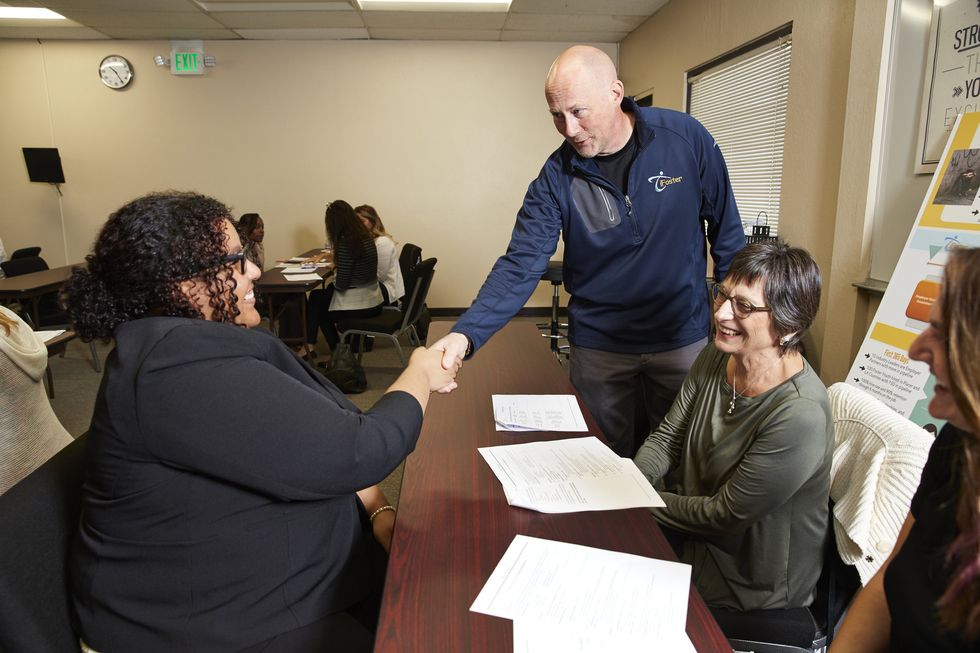In Crisis, L.A.'s New Civic Tech Program Pivots from Providing Internships to Basic Needs
Sam primarily covers entertainment and media for dot.LA. Previously he was Marjorie Deane Fellow at The Economist, where he wrote for the business and finance sections of the print edition. He has also worked at the XPRIZE Foundation, U.S. Government Accountability Office, KCRW, and MLB Advanced Media (now Disney Streaming Services). He holds an MBA from UCLA Anderson, an MPP from UCLA Luskin and a BA in History from University of Michigan. Email him at samblake@dot.LA and find him on Twitter @hisamblake

The vision of LA-Tech.org as it prepared to launch this month was of a thriving tech ecosystem coordinating its resources to give back to the L.A. community.
Built by a group of L.A. CEOs and founders from the likes of Cornerstone, Blackline and Factual, the coalition originally sought to bridge the growing divide between wealth and want in Los Angeles through programming to provide low-income youth with internship opportunities at tech companies like Snap and ZipRecruiter. The idea was both to give back and to support the L.A. tech world by strengthening its local labor pool and helping employees feel connected to their community.
But as the coronavirus plagued one corner of the world after another, holding live events became impossible and the suffering of low-income Angelenos took on new urgency. Taking a page out of the startup playbook, LA-Tech.org has pivoted. It is now launching with a fundraising program to raise $415,000 for two local nonprofits, Homeboy Industries and iFoster. In doing so, LA-Tech.org is addressing two areas of severe collateral damage caused by the pandemic: food security and the digital divide.
An Ugly Crisis, Acute Needs
"The economic contraction that's happening in L.A. right now is worse than it was in the last recession," said LA-Tech.org Executive Director Sean Arian, who in 2008 was Director of Economic Development for L.A. Mayor Antonio Villaraigosa. "It is faster than it was in the last recession, and it is hitting the lowest-income people first."
The crisis, Arian told dot.LA, is thus exacerbating the economic inequality that spurred the formation of LA-Tech.org in the first place. Since 1990, low-wage service jobs have grown in L.A. by 17%, while high-wage, mostly high-knowledge jobs have grown by 7%. But middle-wage jobs have plummeted.
Whereas the 2008 recession first struck the well-off – mostly via finance and real estate – the coronavirus fallout is most acute among the economically vulnerable. Worse, the nonprofit community that seeks to serve such people has seen its funding shrivel.
"The need for services for low-income people has gone way up at the same time that revenues – basically donations – to nonprofits have started to dry up," Arian said.
After several conversations across government, nonprofits, and the private sector, LA-Tech.org had its plan of action.
Combating Food Security with the Homies

Homeboy Industries helps formerly incarcerated gang members heal from conflict and trauma and re-enter society. Included in its suite of therapeutic programs is a chain of social enterprises – the Homeboy café, bakery and catering service – where a subset of members work, usually before moving on to jobs elsewhere. About 90% of participants have never held a job for more than a month, Homeboy chief executive Tom Vozzo told dot.LA.
With the coronavirus shuttering its programming and slashing business traffic, Homeboy can't serve or employ as many people. In response, it, too, has pivoted, to making fresh, prepackaged meals. And it will now be getting a hand from LA-Tech.org.
"If we can get to 1,000 meals a day then in our café we can get to employing the same amount of people we had before we closed our doors," Vozzo said. Currently they're making less than 500 meals per day.
Donations will not just help Homeboy keep its program running, but will also send prepackaged meals to the needy, including people experiencing homelessness, foster youth, and low-income seniors.
"There are a lot of tech companies that have these huge catering budgets they aren't using anymore," Arian noted. He hopes these funds can be redeployed via LA-Tech.org to Homeboy.
Having adjusted its operations to accommodate social distancing, Homeboy is ready to move quickly. "Once the L.A. tech community donates money to us, in 48 hours we're turning that around into meals."
Filling the Digital Divide with iFoster
"What happens when someone who's a low-income student has to do all their learning online and doesn't have a laptop?" noted Arian.
"Mass panic," said Serita Cox, co-founder and chief executive of iFoster, an L.A.-based, national nonprofit that aims to provide resources to foster youth.
Normally, Cox told dot.LA, items like laptops and smartphones are a key priority for iFoster, because technology isn't included in typical child welfare benefits. A joint study with USC, Cox noted, found that only 21% of late-high school and early-college age foster youth in L.A. county had access to the internet and a computing device at home; that compares to 79% of non-foster, low-income students aged 13-17, according to a Pew Research report.
"In child welfare, technology took a backseat to basic needs," Cox said. "But now, technology has come front and center as a basic need."
The list of resources that foster youth depend on but can no longer access face-to-face include school, family visits, social workers, attorneys and therapists. Requests for gear have ballooned, from a typical 50 per week to over 500.
Stepping Up for L.A.
LA-Tech.org has a fundraising goal to deliver 1,000 laptops through iFoster.
"Only 8% of foster youth ever get a college degree," Cox said. "We can't make it worse."
Arian wants tech companies throughout the community to get involved with the Step Up For LA program and "make it their own."
It's the beginning of what the LA-Tech.org founders hope will be an ongoing collaboration among the tech community in its efforts to give back.
"We felt," said Adam Miller, Chief Executive of Cornerstone OnDemand and co-chair of the LA-Tech.org Board (also a dot.LA investor), "like we could accomplish this collectively much better than we could individually."
---
Sam Blake is a reporter at dot.LA, where he primarily focuses on media & entertainment. Find him on Twitter @hisamblake and email him at samblake@dot.LA
- homeboy-industries - dot.LA ›
- Fighting Inequality Amid COVID-19: L.A. Tech CEOs' New Initiative ... ›
- Join dot.LA for Our Discussion on Ageism in the Workplace - dot.LA ›
- How iFoster Saved the Semester forFoster Youth in College ›
- Meet Fika Accelerator, a New LA-Based Educational Incubator - dot.LA ›
- LATech.org Launches 1000 Internships Initiative - dot.LA ›
Sam primarily covers entertainment and media for dot.LA. Previously he was Marjorie Deane Fellow at The Economist, where he wrote for the business and finance sections of the print edition. He has also worked at the XPRIZE Foundation, U.S. Government Accountability Office, KCRW, and MLB Advanced Media (now Disney Streaming Services). He holds an MBA from UCLA Anderson, an MPP from UCLA Luskin and a BA in History from University of Michigan. Email him at samblake@dot.LA and find him on Twitter @hisamblake






 Image Source: Skyryse
Image Source: Skyryse